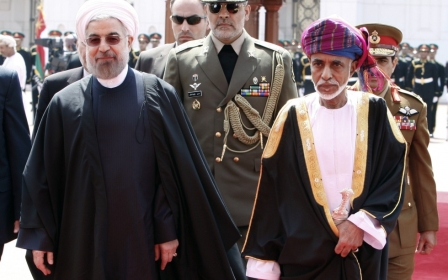Iran's president warns against 'nuclear apartheid'

President Hassan Rouhani has warned that Iran will not accept "nuclear apartheid" with regards to its atomic enrichment activities, in an announcement made on state television on Sunday.
The warning comes ahead of further P5+1 talks in Vienna on Tuesday, where Iran and six world powers will begin the drafting of a comprehensive deal on the Iranian nuclear programme.
In his statement, Rouhani emphasised that Iran would not be retreating in its enrichment programme. "We have nothing to put on the table and offer to them but transparency," he announced. "That's it. Our nuclear technology is not up for negotiation. We will not accept nuclear apartheid."
The self-declared moderate president has faced a battle from domestic critics of his diplomatic outreach since taking power last August.
Hardliners accuse Rouhani of making concessions for little gain under talks that have started to reverse the political isolation Iran grappled with under his hardline predecessor Mahmoud Ahmadinejad.
Stay informed with MEE's newsletters
Sign up to get the latest alerts, insights and analysis, starting with Turkey Unpacked
Other sceptics of the nuclear talks, including members of the US Congress, doubt if Rouhani is genuine in seeking a lasting agreement.
Enrichment to be discussed
The talks on Tuesday will focus on a number of key issues.
Primary is the issue of enrichment - a deal reached in November has seen Iran suspend the enrichment of uranium to 20% purities, but has continued enriching to 5%. 90% is the required enrichment level for the creation of weapons-grade uranium, but the P5+1 nations still want Iran to reduce the number of centrifuges, the machines used for enriching, from the current 20,000 it currently owns.
They also warn that Iran's current stock of enriched uranium - enough for several bombs if purified further - will also have to be addressed.
There is also the issue of increased scrutiny of Iran's operations.
The International Atomic Energy Agency (IAEA), the UN watchdog, regularly inspects Iran's nuclear facilities and painstakingly accounts for every ounce of nuclear material.
Under November's deal, the IAEA was given more oversight including daily inspections of certain sites, access to places such as uranium mines and more details on Iran's facilities and plans.
The powers want enhanced inspections to be made permanent, possibly by Iran adhering to the so-called "additional protocol" of its inspections agreement with the IAEA.
They also want Iran to answer the IAEA's long-standing questions about evidence suggesting that before 2003, and possibly since, Tehran looked into developing nuclear weapons.
Iran has rejected such claims, saying they are based on faulty intelligence from the CIA and Israel's Mossad -- intelligence that it has not been allowed to see.
Iran has promised to explain to the IAEA its use of certain detonators that could be used in a nuclear weapon -- they also have non-nuclear applications -- by May 15, but this is only the beginning.
The powers also want a final deal to cover Iran's development of ballistic missiles, which could in theory carry nuclear warheads. The UN Security Council called in 2010 for a halt.
Iran says that its missile programme should not be part of the talks because they have nothing to do with its nuclear programme, which it insists is purely peaceful.
On Sunday, Rouhani lambasted the world's power for its intrusiveness. "We want to tell the world they cannot belittle the Iranian nation; they have to respect it," he said
Iran has suffered years of economic hardship exacerbated by international sanctions designed to coerce the country into curbing its nuclear work.
Talks in New York on May 6 and 7 were described as "constructive" by Iran's nuclear negotiator Hamid Baeedinejad.
Middle East Eye delivers independent and unrivalled coverage and analysis of the Middle East, North Africa and beyond. To learn more about republishing this content and the associated fees, please fill out this form. More about MEE can be found here.




